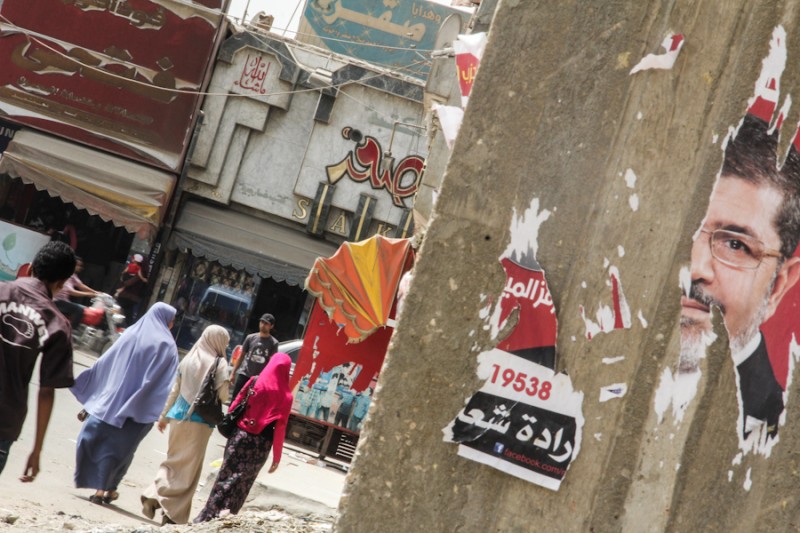(photo credit: Mosa’ab Elshamy)
CAIRO — The Muslim Brotherhood has defiantly rejected attempts by the ruling military council (SCAF) to hold on to power as parliament speaker Saad El-Katanti announced the governing body would convene as scheduled on Tuesday despite attempts to dissolve it.
The military has ordered all parliament doors locked and has stationed troops around the entire premises to bar entrance, thus setting the stage for an aggressive confrontation. Some elected lawmakers have threatened to hold a sit-in protest at Tahrir Square.
The Brotherhood’s newfound power won through an elective process was summarily stripped away when the Supreme Constitutional Court ruled that last spring’s election was unconstitutional and ordered the parliament to be dissolved, a move which many Egyptians are calling a “coup.”
Egyptian analyst Bassem Sabry told The Media Line that there may be a better alternative for the Muslim Brotherhood to fight the dissolution of the troubled parliament, rather than taking to the streets in protest.
“Given how unpopular this parliament became after it was elected, the best course of action is to call for a referendum,” advises Sabry.
Just minutes after runoff voting concluded in Egypt’s first competitive presidential elections Sunday night, the country’s ruling military council issued an interim constitution undermining the presidency and granting itself broad powers over the new government’s legislation, national budget and military affairs: all without any oversight.
The military’s latest in a series of bold assertions of its power comes just days before it is scheduled to finally transfer authority to civilian rule when the president-elect takes office on June 30, after months of promises to do so.
Muslim Brotherhood candidate Dr. Mohamed Mursi claimed victory over Ahmed Shafiq, ousted president Hosni Mubarak’s confidant and last prime minister, early Monday morning after unofficial vote counting showed he won around 52 percent of the vote, with about 97 percent of polling stations reporting. The initial estimated voter turnout was not higher than the first round’s 46 percent.
At Mursi’s campaign headquarters, the candidate thanked God, his supporters, and all Egyptians, giving special words of appreciation to women and the Christian minority, two groups that fear their rights might be suppressed under the governance of an Islamist.
Mursi promised all Egyptians a “civil, democratic, constitutional and modern state,” with no mention of Islamic law. “No one’s rights will be left out of it, and no one will dominate over the other,” he told them.
As soon as Mursi finished speaking, the room full of Brotherhood members erupted with chants of “Down with military rule!,” reflecting a continuation of the great power struggle over Egypt.
At the present time, the Egyptian revolution has reached a critical stage. Muslim Brotherhood supporters and others have announced they were mobilizing protests and were gathering at Tahrir Square to try and save the revolution and prevent SCAF from holding on to power.
Egyptian photographer and political commentator Mosa’ab Elshamy said Mursi’s win would give the Brotherhood the legitimacy to possibly save the parliament, or at the very least, an awareness and renewed vigor in the fight against SCAF’s sweeping power grabs.
“If they lose parliament for good but win the presidency, they risk losing power there as well if they don’t learn their lessons from this disbanded parliament’s mistakes,” Elshamy told The Media Line.
But the Brotherhood may be too busy celebrating a historic moment for the organization after 84 years of persecution to think clearly about the long battle ahead for Egypt.
At dawn, the cheering crowd outside Mursi’s headquarters — around the corner from the Interior Ministry, infamous for arresting and torturing Brotherhood members for decades — headed to join other revelers in Tahrir Square.
Elshamy, who voted for Mursi as a vote against Shafiq, hopes the Brotherhood “doesn’t wake up with a hangover” and will realize the “mess” Egypt is in, excluding the one SCAF just created.
“The ‘deep state’ has had a lot of problems for a long time, and a Brotherhood presidency alone is not going to have the power to demilitarize it anytime soon,” he said. “Only if the Brotherhood leverages their legitimacy, they could do it politically, coupled with street action in a long term battle.”
The Muslim Brotherhood will find support on the streets more difficult to muster after its parliament’s failures have divided the country, but Elshamy believes that SCAF’s power grabs have galvanized the Brotherhood to do more to demilitarize the state.
Meanwhile Shafiq’s campaign is contesting the results, accusing the Brotherhood of cheating. Egypt’s presidential elections committee will announce official results on Thursday. But by then Egypt’s fight for democracy could re-erupt where it all started; at Tahrir Square.

